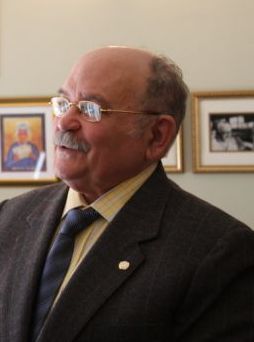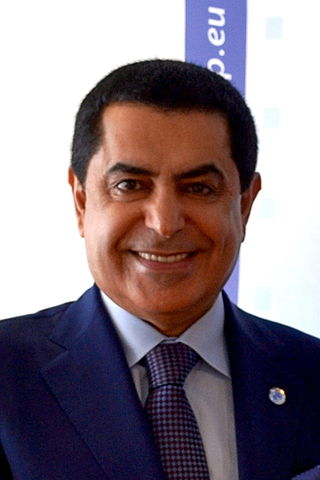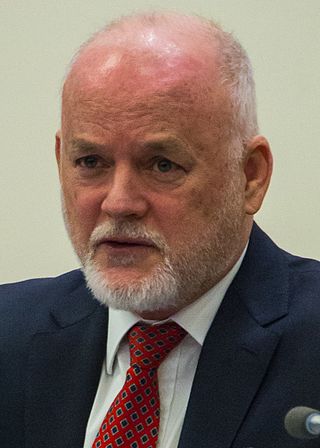
The United Nations General Assembly is one of the six principal organs of the United Nations (UN), serving as its main deliberative, policymaking, and representative organ. Currently in its 78th session, its powers, composition, functions, and procedures are set out in Chapter IV of the United Nations Charter. The UNGA is responsible for the UN budget, appointing the non-permanent members to the Security Council, appointing the UN secretary-general, receiving reports from other parts of the UN system, and making recommendations through resolutions. It also establishes numerous subsidiary organs to advance or assist in its broad mandate. The UNGA is the only UN organ where all member states have equal representation.

Joseph Deiss is a Swiss economist and politician who served as a Member of the Swiss Federal Council from 1999 to 2006. A member of the Christian Democratic People's Party (CVP/PDC), he first headed the Federal Department of Foreign Affairs (1999–2002) before transferring to the Federal Department of Economic Affairs (2003–2006). Deiss was elected President of the United Nations General Assembly for its 65th session in 2010.

Miguel d’Escoto Brockmann was an American-born Nicaraguan diplomat, politician and Catholic priest of the Maryknoll Missionary Society. As the President of the United Nations General Assembly from September 2008 to September 2009, he presided over the 63rd Session of the United Nations General Assembly. He was also nominated as Libyan Representative to the UN in March 2011. He died on 8 June 2017, having suffered a stroke several months earlier.

Doris Leuthard is a Swiss politician and lawyer who served as a Member of the Swiss Federal Council from 2006 to 2018. A member of the Christian Democratic People's Party (CVP/PDC), she was elected as President of the Swiss Confederation for 2010 and 2017. Leuthard headed the Federal Department of Economic Affairs until 2010, when she became head of the Federal Department of Environment, Transport, Energy and Communications. As of 19 December 2019 she is a member of the board of the Kofi Annan Foundation and Stadler Rail.

The United Nations General Assembly Second Committee is one of the six main committees of the United Nations General Assembly. It deals with global finance and economic matters.

The United Nations General Assembly Fourth Committee is one of six main committees of the United Nations General Assembly. It deals with a diverse set of political issues, including UN peacekeeping and peaceful uses of outer space. However, the issues of decolonization and the Middle East take up most of its time.

The Sixty-sixth Session of the United Nations General Assembly opened on 13 September 2011 at 15:00 and was presided over by former Qatari permanent representative to the UN Nassir Abdulaziz Al-Nasser. The session ended on 18 September as al-Nasser symbolically passed the gavel to the president of the next session, Vuk Jeremic.

The Sixty-seventh session of the United Nations General Assembly opened on 18 September 2012 and having its last scheduled meeting on 11 September 2013. The President of the United Nations General Assembly was chosen from the EEG with Serbia's then foreign minister Vuk Jeremić beating out Lithuania's Dalius Čekuolis in an election. Notably, the session led to United Nations General Assembly resolution 67/19 which granted Palestine non-member observer state status.

The Sixty-eighth Session of the United Nations General Assembly opened on 17 September 2013. The President of the United Nations General Assembly was chosen from the GRULAC with Antigua and Barbuda's John William Ashe being the consensus candidate, thus bypassing the need for an election.

The Sixty-Ninth session of the United Nations General Assembly opened on 16 September 2014. The President of the United Nations General Assembly was chosen from the African Group with Uganda's Sam Kutesa being the unanimous African Union's Executive Council's candidate, thus bypassing the need for an election.

The 70th Session of the United Nations General Assembly opened on 15 September 2015. The President of the United Nations General Assembly was from the Western European and Others Group.

The Seventy-first Session of the United Nations General Assembly opened on 13 September 2016. The President of the United Nations General Assembly is from the Asia-Pacific Group.

The Seventy-second Session of the United Nations General Assembly opened on 12 September 2017. The President of the United Nations General Assembly was from the Eastern European Group.

The Seventy-third session of the United Nations General Assembly was opened on 18 September 2018. The President of the United Nations General Assembly was from the GRULAC group.

The Sixty-fourth session of the United Nations General Assembly was the session of the United Nations General Assembly that ran from 15 September 2009 to 14 September 2010. The President of the session, Ali Abdussalam Treki of Libya, was elected from the Group of African States on 10 June 2009 by acclamation.

The Seventy-fourth session of the United Nations General Assembly was the session of the United Nations General Assembly which was opened on 17 of September 2019 until 16 September 2020.

The Sixty-third session of the United Nations General Assembly was the session of the United Nations General Assembly that ran from 16 September 2008 to 14 September 2009.

The General Debate of the sixty-fifth session of the United Nations General Assembly was the first debate of the 65th Session of the General Assembly that ran from 23 – 29 September 2010. Leaders from Member States addressed the General Assembly.

The Seventy-fifth session of the United Nations General Assembly was the session of the United Nations General Assembly which ran from 16 September 2020 to 15 September 2021. The President for the session was Volkan Bozkır, who stated that the session's theme was "The future we want, the United Nations we need; reaffirming our collective commitment to multilateralism".

The Seventy-sixth session of the United Nations General Assembly was the session of the United Nations General Assembly which ran from 14 September 2021 to 13 September 2022. The President of the UN General Assembly is from Asia-Pacific Group.

















